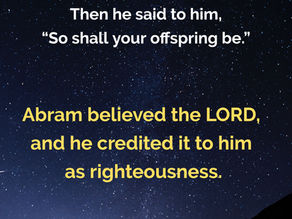Ezekiel 37:1-10 - 'Dem Bones
- Chad Werkhoven
- May 17, 2023
- 3 min read
If you think the Bible is boring, you haven't read Ezekiel 37!

Read / Listen
Read Ezekiel 37:1-10
The hand of the Lord was on me, and he brought me out by the Spirit of the Lord and set me in the middle of a valley; it was full of bones. 2 He led me back and forth among them, and I saw a great many bones on the floor of the valley, bones that were very dry. 3 He asked me, “Son of man, can these bones live?”
I said, “Sovereign Lord, you alone know.”
4 Then he said to me, “Prophesy [preach] to these bones and say to them, ‘Dry bones, hear the word of the Lord! 5 This is what the Sovereign Lord says to these bones: I will make breath enter you, and you will come to life. 6 I will attach tendons to you and make flesh come upon you and cover you with skin; I will put breath in you, and you will come to life. Then you will know that I am the Lord.’ ”
7 So I prophesied as I was commanded. And as I was prophesying, there was a noise, a rattling sound, and the bones came together, bone to bone. 8 I looked, and tendons and flesh appeared on them and skin covered them, but there was no breath in them.
9 Then he said to me, “Prophesy to the breath; prophesy, son of man, and say to it, ‘This is what the Sovereign Lord says: Come, breath, from the four winds and breathe into these slain, that they may live.’ ” 10 So I prophesied as he commanded me, and breath entered them; they came to life and stood up on their feet—a vast army.
Listen to passage & devotional:
Heidelberg Catechism Q&A 53
Q. What do you believe
concerning “the Holy Spirit”?
A. First, he, as well as
the Father and the Son,
is eternal God.
Second, he has been given
to me personally,
so that, by true faith,
he makes me share
in Christ
and all his blessings,
comforts me,
and remains with me forever.
Summary
The Old Testament book of Ezekiel can be one of the hardest to understand in the whole Bible. Ezekiel paints fantastic word pictures and describes often unimaginable scenes of God's glory that are not only hard to picture but sometimes even harder to interpret.
But this episode we read today is one of Ezekiel's most famous, and although it presents a striking story of dry, dead bones morphing back into living beings, this story isn't difficult to interpret (it helps that Ezekiel tells us exactly what it means in the following verses).
The bones represent God's people, who described themselves as dried up and hopeless. What's amazing is that God uses the same tool to save them that He uses on you: He sends them a preacher to prophesy, a word we often associate with predicting the future, but which actually means to proclaim God's Word on His behalf.
Ezekiel's preaching has an immediate effect. Imagine what the 'rattling' sounded like as bones reconnected to each other in exactly the right sequence, and what it looked like as they were then suddenly yet incrementally fleshed out into full bodies!
But as powerful as preaching is, it has a big limitation. It can reassemble broken bones, build up muscle and tendon, and cover it all with a thick skin, but it can not restore life to that which is dead. Ezekiel had witnessed a true miracle in that dry bones were transformed into healthy bodies; healthy, but still dead.
But God still had use for the tool He'd given to Ezekiel, and He called Him to use it one more time. Preach, God said, but this time not to the bones, but rather to the breath. Whose breath, Ezekiel must have wondered! Certainly not the bodies laying before him, for "there was no breath in them (v8)."
Here's where it helps to have read lots of the Bible. You probably remember reading that as soon as God finished forming Adam from the dust of the ground, He put His own breath into Him, and he became a living being (Gen. 2:7). Both in Hebrew (the language Ezekiel was written in) and in Greek (the language of the New Testament), the word for breath / wind is the same exact word as is used for spirit.
God makes it clear who the breath Ezekiel summoned belonged to in v14 -
I will open your graves and bring you up from them. I will put my Spirit in you and you will live...
Dig Deeper
We spent the opening months of this year being reminded that we were born dead in sin, as dry and lifeless as the bones God brought Ezekiel to.
The primary tool God has used to reanimate you is preaching - certainly on the Lord's Day from the pulpit, but also from teachers, elders and parents as they shared the Bible with you in various ways. The story of the dry bones is an excellent example of why you need even more preaching if you want to be healthy and strong.
But all the preaching in the world is in vain without the blessing of the Holy Spirit, who turns hearts of stone into hearts of flesh that accept God's Word through faith.
Don't miss the command God gave to Ezekiel to "preach to the Breath." You can do that by praying that the Holy Spirit will strengthen your faith and breath into the sin-slain people around you that they may live (v9).
ACKNOWLEDGE WHO GOD IS: Our Father, the creator of life who sends out preachers to restore life;
ALIGN YOUR LIFE WITH GOD'S WILL: Prophesy to the breath... pray that the Holy Spirit will further enliven you and bring new life to the spiritually dead around you.
ASK GOD FOR WHAT YOU NEED:
Read the New Testament in a year, a chapter a day - Romans 2



















Comments